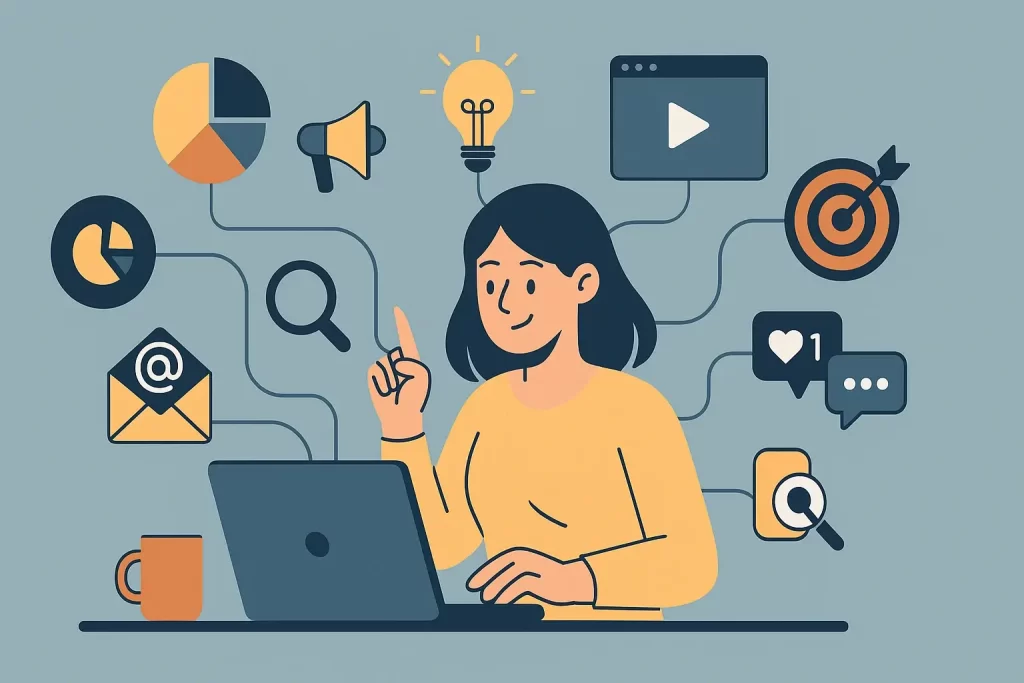What Exactly Does a Digital Marketer Do?

Let’s be honest: the term “digital marketer” gets thrown around a lot. But what does a digital marketer really do?
If you’re picturing someone glued to a screen, switching between Google Ads and Instagram Reels, you’re not too far off. But there’s more to it. A lot more.
Take this quick quiz to discover how much you understand about the world of digital marketing—and why it matters for your business.
You might even be one already, if you’ve promoted your business online, built a social media following, or written a blog post with search intent in mind.
Still, to get a clearer picture, let’s break it down.
A Digital Marketer Wears Many Hats
At its core, digital marketing is about one thing: connecting with people. It’s not just about shouting messages into the void. It’s about saying the right thing, in the right place, at the right time.
You’ll work across platforms like Google, Facebook, LinkedIn, YouTube, TikTok, Instagram, Reddit, and maybe a newsletter or two. Sound familiar?
Your job is to help people discover a product, feel something about it, and take action. That might be clicking a link, signing up, downloading, or buying.
And you can measure nearly all of it.
Core Responsibilities of a Digital Marketer
You Plan. Execute. Optimize.
You might:
Run paid ad campaigns (PPC) on Google or Meta
Create organic content for Instagram, LinkedIn, or TikTok
Optimize websites for search (SEO)
Build email workflows to nurture leads
Research keywords and search trends
Analyze data from tools like Google Analytics, HubSpot, or Looker Studio
Test landing pages or headlines for better conversion
If you work at an agency, you’re juggling accounts and switching gears quickly. One day, you’re working on a B2B software company. The next? An e-commerce brand selling eco-friendly shampoo.
Skills You Need as a Digital Marketer
Let’s break it down. What should you actually know?
1. SEO & SEM: Search is how people find things. If you can help your brand show up first, you win.
Basic SEO means you:
Know how to do keyword research
Understand title tags, headers, and meta descriptions
Use internal linking smartly
SEM? That’s paid search. You bid on keywords to get seen.
2. Content Marketing: Writing is a superpower. Whether it’s blogs, captions, ads, or scripts.
The best digital marketers understand:
How to speak to an audience
How to structure a message
How to repurpose content across formats
3. Data & Analytics: If you can’t measure it, you can’t improve it.
You need to:
Pull data from platforms (like Meta Ads Manager or Google Ads)
Read reports and spot patterns
Understand conversion rates and ROAS
4. Paid Media: From Google Ads to YouTube pre-roll, Facebook to LinkedIn, paid media is about targeting and results.
Learn to:
Set up campaigns
A/B test creatives and copy
Adjust bids based on performance
5. Email & CRM: Still powerful. Email marketing is great for retention, nurturing, and direct conversion.
Tools: Mailchimp, HubSpot, Klaviyo.
You might:
Build a newsletter calendar
Set up automated flows (welcome series, abandoned cart)
Segment audiences
6. AI & Automation: The future is here. AI helps you:
Brainstorm content ideas
Generate ad copy
Analyze data patterns
But you still need a human brain to guide it.
7. UX Thinking: Digital marketers obsess over the user journey.
From first click to final sale, you ask:
Is the message consistent?
Is the CTA clear?
Does the landing page match expectations?
What It Looks Like Day to Day
You might:
Plan a campaign in the morning
Write ad copy after lunch
Jump on a client call to review performance
Adjust budgets before wrapping up
And yeah, sometimes you’re digging into messy spreadsheets. But you’re also experimenting, building, and growing brands.
Expect to:
Monitor campaign KPIs
Review weekly reporting decks
Communicate findings with the team or client
Constantly learn from what worked (or didn’t)
Different Digital Marketing Roles
You can go deep into one thing or become a generalist.
Some career paths:
| Role | Key Responsibilities |
|---|---|
| SEO Specialist | Deep dive into on-page, off-page, and technical SEO. |
| Paid Ads Specialist (PPC) | Own Google, Meta, or LinkedIn Ads campaigns. |
| Social Media Manager | Plan content calendars, respond to followers, and build brand presence. |
| Content Strategist | Oversee blogs, video scripts, eBooks, and infographics. |
| Email Marketing Manager | Own nurture sequences, promotions, and A/B tests. |
| Analytics Manager | Pull insights, track funnels, and report on metrics. |
| Digital Marketing Manager | Oversee all of it. Align with business goals. |
Soft Skills That Matter
Curiosity: Platforms change every month. Stay hungry.
Communication: Write clearly. Present data simply.
Problem-solving: Find the gaps. Suggest fixes.
Collaboration: You’ll work with writers, designers, devs, and sales.
Adaptability: What worked last month might flop this month.
Tools You Might Use
Google Ads & Analytics
Meta Business Suite
LinkedIn Campaign Manager
SEMrush / Ahrefs / Ubersuggest
Canva / Figma / Adobe
Notion / Trello / Asana
HubSpot / Klaviyo / Mailchimp
ChatGPT / Jasper / Gemini (AI tools)
10 Most Successful Digital Marketers’ Campaigns Explained
- Nike’s iconic slogan became more than just a phrase; it was a movement. Through powerful storytelling and inspirational ads featuring athletes, Nike connected emotionally with its audience, fostering brand loyalty and driving massive sales.
Key Takeaways
1. Emotional Storytelling: Nike transforms ordinary moments into extraordinary journeys, proving that greatness isn’t born from perfection but from grit, passion, and the courage to rise after every fall.
2. Focus on “Why” Over “What”: The campaign turns “Just Do It” into a rallying cry, reminding us that success isn’t about the sport itself; it’s about the relentless drive to push past limits, one yard at a time.
3. Cultural Relevance and Localization: By celebrating local heroes and cultural rhythms, Nike doesn’t just sell a product; it builds a movement, proving that true connection lies in honoring the heartbeat of the community.
4. High-Quality Visuals and Pacing: Every frame pulses with energy: cinematic shots of sweat, struggle, and triumph, capturing the raw intensity of sport and turning it into art that ignites action.
5. Empowerment Through Simplicity: A single word, “Yards,” becomes a mantra, distilling the chaos of competition into a universal truth: greatness isn’t given, it’s earned, one step, one swing, one relentless heartbeat at a time.
- This personalized campaign swapped out the classic Coke logo for popular names on bottles, encouraging customers to find and share their personalized drink. The result? A boost in sales and a viral social media wave as people posted photos of their bottles.
Old Spice’s “The Man Your Man Could Smell Like”
- Old Spice revamped its image with a humorous, engaging ad that showcased its products in an unforgettable way. The campaign, which featured Isaiah Mustafa’s quirky monologues, went viral and revitalized the brand.
- Dove’s emotional campaign focused on how women perceive their own beauty versus how others see them. The message of self-love and confidence resonated globally, earning millions of views and creating strong brand affinity.
- Although it was for a charitable cause, this viral campaign is a lesson in user-generated content. The challenge spread like wildfire across social media, raising over $115 million for ALS research while showing the power of engagement.
- Apple tapped into its users’ creativity by launching the “Shot on iPhone” campaign, which featured real photos taken by users. This user-generated content strengthened trust and showcased the quality of the iPhone’s camera.
- Digital marketers of Always tackled gender stereotypes with the #LikeAGirl campaign, which questioned why doing things “like a girl” was seen as an insult. The campaign sparked conversations, empowering their audience and aligning the brand with social progress.
Airbnb’s “We Are Here” Campaign
- Airbnb created a series of live experiences streamed on social media, highlighting local culture and communities. This campaign boosted brand awareness and positioned Airbnb as more than just a booking service; it was an experience platform.
- Spotify took user data to a personal level by launching “Wrapped,” which showcased users’ top songs, artists, and genres for the year. It was widely shared on social media and strengthened user loyalty.
- Wendy’s digital marketer’s playful and sometimes sassy approach on Twitter turned into a viral success. Their witty comebacks and creative roasts generated engagement and drew attention to the brand without traditional advertising.

Our 10 Most Successful Marketing Campaigns for Clients
1. TilesWale: From Struggling to Leading
Before: TilesWale faced tough competition and low visibility.
Help from Intent Tale:
- Secured the WhatsApp Green Tick, making them more trustworthy.
- Ranked for 419 keywords, bringing 379 new visitors each month.
- Created content that connected with people.
Results: TilesWale became a trusted leader with better traffic and loyal customers.
2. Star Academy: From Aspiring to Influential
Before: Hard to stand out in the beauty market and get student interest.
Help from Intent Tale:
- Earned the WhatsApp Green Tick after three tries, boosting credibility.
- Created PR articles that got 610 views and increased awareness.
- Optimized their digital space, growing Instagram followers to 29.8 K.
Results: More students, trust, and industry recognition.
3. EcoCare Technologies: From Hidden to Eco-Leader
Before: Low visibility and barely any traffic (only 2 visits a month).
Help from Intent Tale:
- Secured the WhatsApp Green Tick for trust.
- Ranked for 9 eco-friendly keywords.
- Added 794 backlinks, boosting traffic by 500%.
Results: EcoCare became known for eco-friendly solutions, with over 1,000 visitors a month.
4. Arise Intensity Academy: From Overlooked to Trusted
Before: Hard to get noticed in the education field.
Help from Intent Tale:
- Earned the WhatsApp Green Tick on the second try.
- Published PR articles on top educational sites.
- Improved digital presence, driving more sign-ups.
Results: Increased trust, visibility, and higher engagement.
5. Metrolite: From Unknown to Trusted
Before: Hard to prove reliability in home services.
Help from Intent Tale:
- Secured WhatsApp Green Tick for instant credibility.
- Improved SEO, ranking for 18 new keywords.
- Built a social media presence, increasing followers.
Results: More customer trust, visits, and inquiries.
6. CSTC: From Low Visibility to Recognized Leader
Before: Low online presence and minimal brand recognition.
Help from Intent Tale:
- Achieved WhatsApp Green Tick for trust.
- Launched PR campaigns reaching 72 million views.
- Improved domain authority and boosted organic traffic.
Results: Better credibility and more online traffic.
7. Make Space Interior: From Rejected to Verified
Before: Repeated WhatsApp verification rejections.
Help from Intent Tale:
- Refined brand message and online details.
- Enhanced online footprint for trust.
Results: Got the Green Tick, more customer trust, and better engagement.
8. SmiloShine: From Setback to Success
Before: Failed to get WhatsApp Green Tick on the first try.
Help from Intent Tale:
- Updated messaging and held trust-building workshops.
- Launched PR efforts that reached 56 million views.
Results: Verified status, higher trust, and social media growth.
9. Zuvius Lifesciences: From Offline to Online Credibility
Before: Hard to show their authority online.
Help from Intent Tale:
- Secured the Green Tick for trust.
- Featured in major media outlets like Forbes India.
Results: Better domain authority and increased online visits.
10. Wildlense Eco Foundation: From Passion to Recognition
Before: Difficult to build trust and visibility.
Help from Intent Tale:
- Secured the Green Tick within 24 hours of Tier 3 status.
- PR article received over 559,000 views.
Results: More monthly visitors and stronger online credibility.
These campaigns show that successful digital marketers rely on creativity, understanding the audience, and authentic storytelling. From household names to emerging brands, each example highlights the power of emotional connections and innovative strategies.
Whether through humor, education, or community-building, digital marketing continues to be an essential tool for businesses aiming to resonate with their audience and drive growth.
Final Thoughts
Digital marketing isn’t just a job. It’s part creativity, part science.
You’re balancing strategy and storytelling. Numbers and nuance. Algorithms and human emotion.
And you’re doing it in a space that changes constantly.
Whether you’re optimizing Facebook ads or brainstorming a killer TikTok trend, your job is to connect.
Make people feel something. Click something. Buy something. Come back again.
So, what does a digital marketer do?
Everything that matters online.
Recommended Reading:
→ How Intent Tale’s G.R.O.W.T.H. Framework Delivers Predictable B2B Revenue
→ Why Using the WhatsApp API is Essential for Conversion (Strategy Guide)
→ 7 Common Mistakes in Performance Marketing (and How to Fix Them)
Frequently Asked Questions About Digital Marketing
What are the duties of a digital marketer?
Digital marketers create and manage campaigns across channels like social media, search engines, and email to drive traffic and convert leads. They also analyze data and improve results.
What skills are needed for digital marketing?
You need SEO, content writing, social media, data analysis, PPC, email marketing, and basic knowledge of tools like Google Analytics and Canva. Creativity and curiosity help, too.
What are the 4 types of digital marketing?
SEO, Content Marketing, Social Media Marketing, and PPC (Pay-Per-Click) are four key types. Others include email marketing, influencer marketing, and affiliate marketing.
Do digital marketers get paid well?
Yes. Entry-level roles start modestly, but experienced marketers, especially those with PPC, SEO, or data expertise, can earn high salaries or freelance rates.
Is digital marketing a risky career?
Not if you stay current. The industry evolves fast, but it’s full of opportunity. Learn constantly and adapt to stay in demand.
Which skill is most demanding in digital marketing?
SEO, PPC, analytics, and content creation are always in demand. AI and automation skills are quickly growing in importance.
Is digital marketing related to IT?
Not directly. You use tech tools, but digital marketing is more about communication, psychology, and strategy than coding or IT.
Is digital marketing effective for small businesses?
Yes. It’s budget-friendly, measurable, and helps small businesses reach targeted audiences and grow without high costs.
How can I become a digital marketer without spending a lot?
Use free tools like Google Digital Garage, HubSpot Academy, and YouTube. Practice with your own blog, LinkedIn, or social accounts.
Is digital marketing cost-effective for small businesses?
Definitely. Email, SEO, and social media offer strong ROI and are scalable. You control spending and track results easily.
How do I start creating digital products for my business?
Start with what your audience needs: eBooks, templates, or courses. Use tools like Canva, Gumroad, or Thinkific to build and sell them.
How hard is it to learn digital marketing for my business?
It’s challenging at first, but very doable. Learn one skill at a time. Apply what you learn. Consistency beats perfection.
How important is SEO in digital marketing?
Very. It boosts visibility, builds trust, and drives free traffic. SEO is foundational to long-term digital success.
What are examples of digital products I can create?
eBooks, checklists, templates, courses, stock photos, and paid newsletters. Digital products scale well and generate passive income.
How can a digital marketer start marketing for my business?
Start with a strategy: define your goals, audience, and platforms. Test small campaigns. Measure, optimize, and build gradually.
















